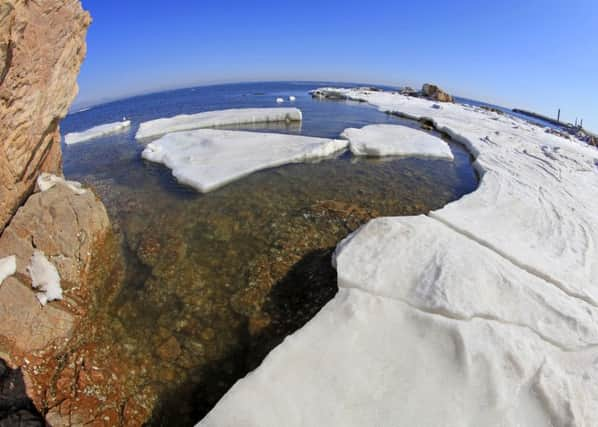Global warming speeding up


And the unprecedented rate of change is likely to trigger “widespread future extinctions.”
A notorious warming period 55 million years known as the Palaeocene-Eocene Thermal Maximum (PETM) - when temperatures rose by at least 5C - is considered the most similar to current conditions.
Advertisement
Hide AdAdvertisement
Hide AdIt led to ‘animal dwarfism’ with horses, deer and other mammals shrinking dramatically in size.
But new research, published in the journal Nature Geoscience, has found the rate of carbon emissions then was ten times slower than man-made activities are causing now - meaning greenhouse gas is being released into the atmosphere at levels unprecedented over the past 66 million years.
Dr Richard Zeebe and colleagues compared the timing of climate change and carbon emissions as recorded by marine sediments - and found they occurred essentially simultaneously.
Using a climate and carbon cycle model they showed the PETM emissions occurred over a period of at least 4,000 years at a rate of between 0.6 to 1.1 billion tonnes of carbon per year.
Advertisement
Hide AdAdvertisement
Hide AdThis compared to modern emissions that are on the order of 10 billion tonnes of carbon per year.
It means many plant and animal species in a wide range of terrestrial ecosystems will need to be able to adapt rapidly to changing conditions in their environment -- or migrate quickly toward the North and South poles - in order to survive.
Dr Zeebe, of Hawaii University in Honolulu, said: “As rapid reductions in anthropogenic carbon emissions seem increasingly unlikely in the near future, forecasting the
Earth system’s response to ever-increasing emission rates has become a high-priority focus of climate research.
Advertisement
Hide AdAdvertisement
Hide Ad“The fastest known, massive carbon release throughout the Cenozoic (past 66 million years) occurred at the onset of the Palaeocene-Eocene Thermal Maximum.
“Given currently available palaeorecords, we conclude that the present anthropogenic carbon release rate is unprecedented during the Cenozoic.”
He said regarding impacts on ecosystems, the present and future rate of climate change and ocean acidification is too fast for many species to adapt which is “likely to result in widespread future extinctions in marine and terrestrial environments that will substantially exceed those at the PETM.”
Dr Zeebe said given the current rate of carbon release is unprecedented we have effectively entered an era of an incomparable state which represents a “fundamental challenge to constraining future climate projections.”
Advertisement
Hide AdAdvertisement
Hide AdDr Peter Stassen, who reviewed the study for the journal, said: “If PETM emissions occurred over a slower timescale as proposed by Zeebe et al., pelagic marine ecosystems may have had sufficient time to adapt to environmental changes through migration or evolution.”
Dr Stassen, of Leuven University in Belgium, added: “It therefore remains possible that the current rates of change might exceed the adaptive capacity of modern marine ecosystems and their constituents.
“Zeebe et al show that although the carbon cycle and temperature changes during PETM were geologically rapid, the carbon release that triggered the event was considerably slower than modern anthropogenic emissions.
“Thus, the biological impact of the current warming cannot be reliably constrained by this ancient analogue, although it offers a window into the climate evolution on millennial timescales.”
What caused the PETM event is unclear although the release of seabed methane clathrates - a kind of methane ice found in ocean sediments - is among the possibilities along with volcanic activity.